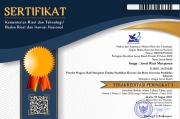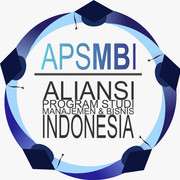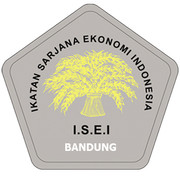RELATIONSHIP MARKETING OUTCOME DALAM KONTEKS PENDIDIKAN TINGGI: PERAN KOMITMEN AFEKTIF, SERVICE CO-CREATION DAN STUDENT ENGAGEMENT
Abstract
Higher Education (HE) efforts in creating value demonstrate its commitment to increasing their competitive way in the education market. Academic quality, improving quality, increasing rankings, and increasing brand value (brand value) are strategies that can be carried out to achieve that ranking. It is also necessary to consider other aspects from the emotional side as a source of organizational success when students as the main customers and the development of long-term relationships with customers is very important for the HE. Customer-oriented has become a central topic in the concept of relationship marketing. Customer loyalty is a concept that is a fundamental relational marketing outcome or it can be implemented as a result of relationship marketing (the result of relationship marketing). This study will focus on variables related to emotional dimensions that contribute to the development of long-term relationships with customers in the context of HE. Specifically, this study will examine the effect of variables, commitment, service creation and engagement on student loyalty. The study results show that customer commitment and engagement affect customer loyalty.
Keywords
References
Allen, N. J. & Meyer, J. P. (1990). The Measurement and Antecedents of Affective, Continuance and Normative Commitment to the Organization. Journal of Occupational Psychology., 63, 1–18.
Bove, L. L., Pervan, S. J., Beatty, S. E., & Shiu, E. (2009). Service Worker Role in Encouraging Customer Organizational Citizenship Behaviors. Journal of Business Research, 62(7), 698–705. https://doi.org/10.1016/j.jbusres.2008.07.003
Brady, M. K. & Cronin Jr., J. (2001). Conceptualizing Perceived Service Quality : A Hierarchical Approach. Journal of Marketing, 65(July), 34–49. http://www.atypon-link.com/AMA/doi/abs/10.1509/jmkg.65.3.34.18334
Bricci, L, Fragata, A., & Antunes, J. (2016). The Effects of Trust , Commitment and Satisfaction on Customer Loyalty in the Distribution Sector. Journal of Economics, Business and Management, 4(2), 173–177. https://doi.org/10.7763/JOEBM.2016.V4.386
Chang, W. S. & Hsieh, J. J. (2011). Intellectual Capital and Value Creation-Is Innovation Capital a Missing Link? International Journal of Business and Management, 6(2), 3–12. https://doi.org/10.5539/ijbm.v6n2p3
Dick, A. & Basu, K. (1994). Customer Loyalty: Toward an Integrated Conceptual Framework. Journal of the Academy of Marketing Science, 22(2), 99–113. https://doi.org/10.1177/0092070394222001
Dollinger, M., Lodger, J., &, & Coates, H. (2018). Co-creation in Higher Education: Towards a Conceptual Model. Journal of Marketing for Higher Education, 28(2), 210–231. https://doi.org/10.1080/08841241.2018.1466756
Ghozali, I. (2013). Aplikasi Analisis Multivariate dengan Program IBM SPSS 21: Update PLS Regresi. Badan Penerbit Universitas Diponegoro, Semarang.
Groth, M. (2005). Customers as Good Soldiers: Examining Citizenship Behaviors in Internet Service Deliveries. Journal of Management, 31(1), 7–27. https://doi.org/10.1177/0149206304271375
Gruen, T. W., Summers, J. O., & Acito, F. (2000). Relationship marketing activities, commitment, and membership behaviors in professional associations. Journal of Marketing, 64(3), 34–49. https://doi.org/10.1509/jmkg.64.3.34.18030
Hair, J. R., Anderson, R. E., Tatham, R. L., & Black, W. C. (1998). Multivariate Data Analysis (5th ed). Upper Saddle River, NJ: Prentice-Hall, Inc.
Hennig-Thurau, T., Gwinner, K. P., & Gremler, D. D. (2002). Understanding Relationship Marketing Outcomes: An Integration of Relational Benefits and Relationship Quality. Journal of Service Research, 4(3), 230–247. https://doi.org/10.1177/1094670502004003006
Lövblad, M., Hyder, A. S., & Lönnstedt, L. (2012). Affective Commitment in Industrial Customer-Supplier Relations: A Psychological Contract Approach. Journal of Business and Industrial Marketing, 27(4), 275–285. https://doi.org/10.1108/08858621211221652
Maduka, O. B. (2016). Effects of Customer Value Co-Creation on Customer Loyalty in the Nigerian Service Industry. International Journal of Business and Management, 11(12), 77–82.
Manggarani, C. A. (2018). The Role of Customer Engagement on Customer Loyalty: A Study at a Private Higher Education. Hasanuddin Economics and Business Review, 2(1), 71–82. https://doi.org/10.26487/HEBR.V2I1.1483
Morgan, R. M. & Hunt, S. D. (1994a). The Commitment-Trust Theory of Relationship Marketing. Journal of Marketing, 58(July 1994), 20–38. https://doi.org/10.2307/1252308
Morgan, R. M. & Hunt, S. D. (1994b). The Commitment-Trust Theory of Relationship Marketing. Journal of Marketing, 58(July 1994), 20–38.
Mustak, M., Jaakkola, E., Halinen, A., & Kaartemo, V. (2016). Customer Participation Management : Developing a Comprehensive Framework and a Research Agenda. Journal of Service Management, 27(3), 250–275. https://doi.org/10.1108/JOSM-01-2015-0014
Nagy, E. S. & Marzouk, W. G. (2018). Factors Affecting Customer Citizenship Behavior: A Model of University Students. International Journal of Marketing Studies, 10(1), 54. https://doi.org/10.5539/ijms.v10n1p54
Naumann, K. & Bowden, J. L. (2015). Exploring the Process of Customer Engagement, Self Brand Connections and Loyalty. Problems and Perspectives in Management, 13(1), 56–66.
Orozco, F. & Arroyo, J. (2017). Students’ loyalty in higher education: the roles of affective commitment, service co-creation and engagement. Journal of Management, 33(57), 96–110.
Priluck, R. (2003). Relationship Marketing can Mitigate Product and Service Failures. Journal of Services Marketing, 17(1), 37–52. https://doi.org/10.1108/08876040310461264
Rifai, A. & W. (2016). The Effort to Create Customer Engagement on Customer E-Banking. Jurnal Dinamika Manajemen, 7(2), 191–205.
Sakthivel, P. B. & Raju, R. (2006). An Instrument for Measuring Engineering Education Quality from Students’ Perspective. Quality Management Journal, 13(3), 23–34. https://doi.org/10.1080/10686967.2006.11918559
Sánchez-fernández, R., Iniesta-Bonillo, M., Schlesinger-Diaz, W., & Rivera-Torres, P. (2010). Analysis of the Value Creation in Higher Institutions: A Relational Perspective. Theoretical and Applied Economics, XVVII(10 (551)), 25–36.
So, K., King, C., Sparks, B. A., &, & Wang, Y. (2014). The Role of Customer Engagement in Building Consumer Loyalty to Tourism Brands. Journal of
DOI: https://doi.org/10.17509/image.v10i2.35080
Refbacks
- There are currently no refbacks.
Copyright (c) 2021 Rully Arlan Tjahyadi
Image : Jurnal Riset Manajemen is licensed under a Creative Commons Attribution-ShareAlike 4.0 International License
View My Stats



